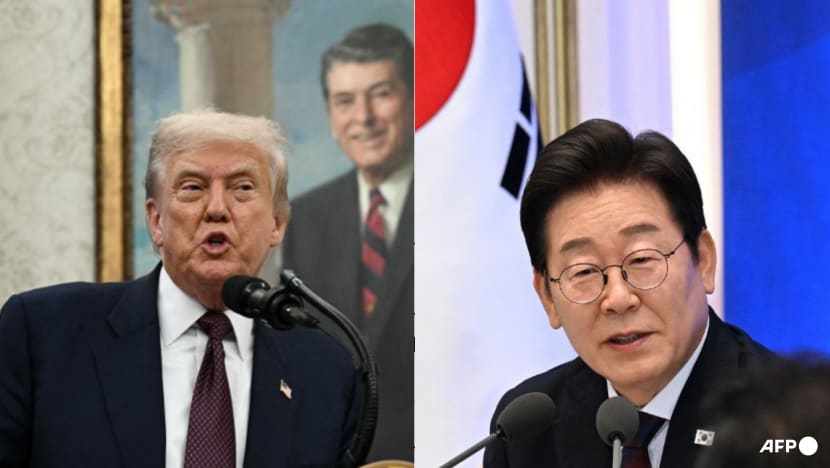Commentary: South Korea needs reassurance, but Trump may make demands instead at their upcoming summit
The future of the US-South Korea alliance may hinge on what happens at the upcoming summit between presidents Donald Trump and Lee Jae-myung, says Pusan National University’s Robert Kelly.

File photos of US President Donald Trump and South Korea President Lee Jae-myung. The two leaders are expected to hold a summit in Washington later this month. (Photos: AFP)

This audio is generated by an AI tool.
BUSAN: Later this month, South Korean President Lee Jae-myung will hold his first summit with US President Donald Trump. As a mid-sized US ally dependent on US security guarantees and market access, the summit is very important for South Korea. It will be closely watched for signals about the future of the alliance.
Unlike previous US presidents, who uniformly supported the US-South Korea alliance, Mr Trump has a more unpredictable approach to US alliances.
During his first term, he criticised the cost of stationing American troops abroad and pushed allies to shoulder more of the burden. At times, he appeared to cast doubt on whether the US would honour its security commitments.
Still, South Korea accommodated Mr Trump, with then-president Moon Jae-in going to great lengths to keep diplomacy on track, even publicly stating that Mr Trump deserved a Nobel Peace Prize for his historic summit in Singapore with North Korean leader Kim Jong Un in 2018.
But much has changed since then, and Mr Lee’s visit to Washington will reflect that.
Only into his second month in office, Mr Lee is navigating a far more complex geopolitical environment, including a deepening US-China rivalry, a more provocative North Korea and shifting regional alliances. At the same time, he faces the task of consolidating public support early in his term.
Mr Trump, meanwhile, is in his second term as president with fewer conventional guardrails than before. He is no longer surrounded by the serious diplomatic professionals of his first term.
Compounding matters, Mr Lee has no flashy diplomatic event to offer. Unlike in 2018, North Korea has expressed no interest in meeting either Mr Lee or Mr Trump.
TRADE LIKELY TO TAKE CENTRE STAGE
Three issues are likely to dominate the upcoming summit. Mr Lee will have little room to avoid the concessions Mr Trump will almost certainly demand.
The first issue is trade. In a last-minute deal, South Korean negotiators persuaded Washington to reduce threatened tariffs on Korean goods from 25 per cent to 15 per cent before they went into effect. But many details about the deal remain unclear.
Adding to the uncertainty, Mr Trump on Wednesday (Aug 6) announced plans to impose a tariff of about 100 per cent on imported semiconductors unless companies manufacture in the US. Seoul has said there will be limited impact from future US tariffs on chips as it had secured “most-favoured-nation” status in the trade deal, but South Korean chipmakers remain on edge as Mr Trump has yet to provide key details.
Mr Lee will likely be eager to seek clarity on this. The US is South Korea’s largest export market, and South Korea’s diversification options are poor. South Korea’s second-largest export market is China, but those ties come with geopolitical costs.
The US, even under Mr Trump, is a less politically and militarily risky trade partner. Mr Trump will probably ask for more investment commitments from South Korea, beyond the US$350 billion Seoul has already pledged to invest in the US.
SECURITY COMMITMENTS
The second issue is defence. Mr Lee will likely seek a reaffirmation of the US-South Korea security relationship, something that, in previous administrations, would have been routine.
Under Mr Trump, however, longstanding US security commitments have come under renewed scrutiny. Earlier this year, Mr Trump made a series of controversial statements, including remarks about potentially taking over Greenland and Canada - both of which belong to NATO - as well as the Panama Canal. He also reportedly suggested launching air strikes against drug cartels in Mexico and pushed Ukraine to cede territory to Russia to end the war.
It is unclear if Mr Trump would fight for any US ally, including South Korea.
Even if Mr Trump agrees to alliance-supporting language in the summit’s final statement, concerns remain about the reliability of such commitments considering his unpredictable approach to foreign policy.
To get a verbal alliance commitment from Mr Trump, Mr Lee will probably have to make concessions on one of Mr Trump’s favourite grievances about US allies - how much they pay to support US troops stationed in-country.
South Korea has 28,500 US soldiers. South Korea pays about half the bill for their support. Mr Trump previously demanded that South Korea, variously, double, triple, or quintuple that payment. He probably will again. South Korea is wealthy enough to pay more, and a US retrenchment from South Korea would likely spark massive capital flight. So Mr Lee is likely to accept a higher payment.
THE NORTH KOREA FACTOR
North Korea is the third issue. In April, the head of the United Nations’ nuclear watchdog warned that North Korea’s nuclear arsenal had ballooned "exponentially” and was “completely off the charts”. There are no inspectors on the ground. No active agreements are in place. And Pyongyang shows little interest in returning to talks.
The North likely has as many as 100 warheads, plus missiles that can range the continental United States. North Korea has repeatedly threatened to use them against both South Korea and America.
If the US meets its alliance commitment to South Korea in the event of a conflict with North Korea, US military bases - in South Korea, Japan, or Guam - will almost certainly become potential targets for North Korean missile strikes, possibly even involving nuclear weapons. In a worst-case scenario, the US mainland might also be at risk.
So the risks of the US commitment to South Korea have gone up enormously. Former president Joe Biden was a committed, old-style internationalist and continued to insist the US would fight despite the rising nuclear threat. Mr Trump is more transactional and may be more reluctant to engage in a conflict that could carry the risk of a nuclear strike on US territory.
It is unclear what Mr Lee can offer Mr Trump to overcome this risk anxiety - perhaps yet further trade or base costs concessions.
Of these three issues, North Korea's nuclear weapons are now the biggest challenge in the US-South Korean relationship.
If the US were not aligned with South Korea, North Korea would not threaten nuclear strikes on the US homeland. If the US did not enter a second Korean war - if it dodged its alliance commitment to South Korea - its Asia-Pacific territories would not become targets.
Conversely, if the US abandons South Korea over these threats, then South Korea will almost certainly nuclearise. It is a harsh choice. As it is, support for nuclear armament in South Korea is already gaining momentum. Public opinion polls frequently indicate over 70 per cent support for developing domestic nuclear capabilities.
Mr Lee and Mr Trump must grapple with all these issues. While President Lee has a good sense of them and will go to Washington prepared, the results of the summit will likely depend less on what South Korea brings to the table, and more on what kind of partner the US is prepared to be.
Robert Kelly (@Robert_E_Kelly) is a professor of political science at Pusan National University. He writes a monthly column for Â鶹, published every second Monday.















